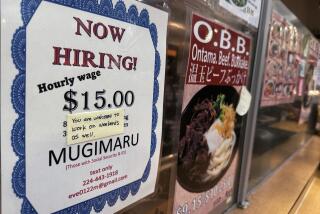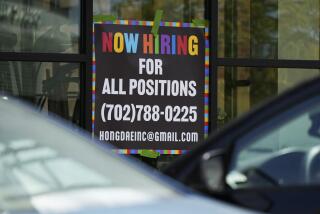Applications for jobless aid edge up
The number of Americans seeking unemployment benefits rose slightly last week, yet remained at a historically low level that points to a healthy job market.
The Labor Department said Thursday that weekly applications for jobless aid increased 2,000 to a seasonally adjusted 279,000. The four-week average, a less volatile measure, rose 3,750 to 278,750.
Even with the increases, both figures remain at very low levels. The average fell to a 15-year low last month. Applications are a proxy for layoffs, so the figures suggest that few Americans are losing their jobs.
“The pace of layoffs is now close to all-time lows as a share of payrolls,” said Ian Shepherdson, chief economist at Pantheon Macroeconomics, in a note to clients.
In addition to holding onto workers, businesses are also stepping up hiring. Employers added 280,000 jobs last month, the government said last week, a strong showing that suggests businesses are staffing up in anticipation of robust consumer demand.
That was more than last year’s monthly average of 263,667, which was the most in 15 years.
The unemployment rate rose to 5.5 percent from 5.4 percent, but even that contained some good news: more Americans, encouraged by their prospects, started looking for work last month. Not all immediately found jobs, lifting the unemployment rate.
The number of people receiving benefits rose 61,000 to 2.27 million, the government said. That is just a fraction of the 8.6 million the government counts as unemployed. Some of those out of work have used up all their benefits, while many others aren’t eligible, such as recent graduates searching for their first jobs.
Average hourly wages, which have grown at a tepid pace since the Great Recession ended six years ago, ticked up in May and have risen 2.3 percent in the past year. That is the fastest annual pace in nearly two years, though it remains far below the 3.5 percent to 4 percent rate typical in a healthy economy.
There are other signs that the economy is doing better after faltering at the start of the year.
On Thursday, the Commerce Department said retail sales rose 1.2 percent in May, as Americans bought more cars, building materials, and clothes. Excluding volatile categories such as gas, autos, restaurants and building materials, sales rose a healthy 0.7 percent.
Separately, a survey last week of purchasing executives found that manufacturing expanded at a faster pace in May as U.S. factories received more new orders.
The economy contracted 0.7 percent in the first three months of the year, a sharp slowdown from growth of 3.6 percent in the second half. Yet most economists expect growth will recover to a 2 percent to 2.5 percent pace in the second quarter.
More to Read
Inside the business of entertainment
The Wide Shot brings you news, analysis and insights on everything from streaming wars to production — and what it all means for the future.
You may occasionally receive promotional content from the Los Angeles Times.










